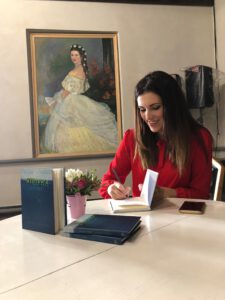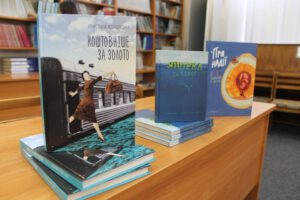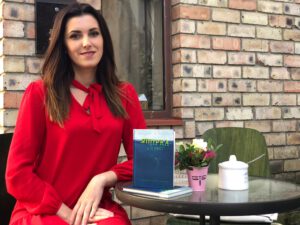„Ukrainian literature is evolving, it is dynamic and diverse“ – Interview with Khrystyna Kozlovska
Find a German translation here.
A few years ago our editor Walther introduced Ukrainian poetry. We wanted to continue this project. So we talked to the Ukrainian poet and author Khrystyna Kozlovska about literature in her home country, the Ukrainian literature market and her own work.

Thanks for finding time to speak with us about Ukrainian poetry and prose. But let us talk about you first. Why did you start writing? And when did you notice that you want to publicate your texts?
I started writing a long time ago, at the age of four I made poems, and my mother wrote them down, because of course I couldn’t write myself. Four years is the age when everything is doing easily, because you only do what you love and without what you can’t be. So the same story was with me, I wrote about absolutely everything around me and it was very natural for me, it was an integral part of my life. Probably, even then the need to express the world in words was formed, a need that has not disappeared to this day. Neither life circumstances, nor experience, nor the desire to convey or explain something to anyone, nor the desire to save the world, no, for me, this is the same occupation as for a four-year-old child, which I once was, it’s part of me.
I felt that I wanted to publish my text as soon as I finished my first book. And, in my opinion, it is very logical. Because if you create a story, then publishing it, releasing it to people, is like the last final stage of that creation, without which a story cannot be completed, because stories exist in order to be told.
With an age of 31 years you are a young author. But you allready reached a lot. In 2011 you won a regional poem competition, three years later a prize from the publishing house „Smoloskyp“. The „Oles Honchar Prize“ followed. It honors the best Ukrainian prose of the year. So you know both, poetry and prose. With which of both are you more comfortable? What can be expressed better in a poem, what in prose?
Yes, I know both. I don’t write poetry anymore, but I still remember how it is. Honestly, I’m more comfortable in prose. Although I’m not sure if it’s possible to compare one with the other, because these are two seemingly similar, but very different in nature activities. The poem is a bunch of ideas, it is a concentrate, where there can be no accidental word, where behind the external chaos and free thought there is still a law and an understanding of everything that is present in this poem. The poem comes suddenly and requires that you respond to it immediately, otherwise it may just pass by. The poem requires constant readiness and the ability to react quickly. The main thing is to get the idea on the hook, and then you can process it. All this is not easy, but the reward for all this will be no less. Writing a poem is like a small substation inside you, gives you so much energy that you can live independently of all other external sources of energy. The poem, like nothing else, shows the power of the word.
Prose is not the same. There is a lot of space and a lot of freedom in it, which I lacked in poetry. In prose, I feel comfortable and relaxed, I do not feel the effects of any laws and prohibitions, but see only the possibilities, unlimited possibilities. When I start writing a new work, I feel like a teenager who still has a lifetime ahead, and this life seems to last forever. In prose, I do not have to hurry anywhere and be afraid to miss the moment of an idea. When ideas for prose come up, I just write them down and they obediently wait for their time, they don’t try to slip away, as they do in poetry. Prose, compared to poetry, is more domesticated. If poetry usually expresses emotion, then prose describes the whole story and what emotion this story will evoke depends only on the reader.
Ukraine is a country which experienced a lot of changes. 1991 it reached independence by the collapse of Soviet Union. Not a long time ago, the annexation of Krim happened. How much is the Ukrainian literature characterized by occupation, searching and finding of identity and resistance (again)?
It seems to me that the search for identities in the broadest sense is long gone. For today’s Ukrainian literature, of course, the war with Russia (and it continues today), the occupation of Crimea and parts of Donbass are relevant. All these influence both the themes and the emotional tone, the manner of speaking. Traumatic experiences have always been used in Ukrainian literature, and this is still to this day, because it is not the first time that Ukraine has encountered Russian aggression, this aggression has been going on for several hundred years. Now there are new authors who write about the war, about the traumatic experience. These works are different, some of them are better, others are inferior in quality. But that fact that they are and that, I am sure, will be is a very good phenomenon that allows both: the whole world and the Ukrainians themselves to see Ukraine from the inside, to see all these complex events through the eyes of eyewitnesses. By the way, a book was recently published, which I would advise everyone who wants to learn more about the Ukrainian-Russian war and the situation in Ukraine in general to read. This is the novel “Dotsia” (“Daughter”} by Tamara Horiha Zernia – an adventure novel about the war in the life of a young woman from Donetsk, who does not run away to a better place, but defends her country when the war begins. The book is written vividly, simply, and romantically. The writer herself says that she described the events in the book, based on the testimony of participants in the events, real people, eyewitnesses. The main character also has a living prototype. An English translation of the novel is planned, so it will soon be available abroad.
What do you think is specific for Ukrainian literature? Are there any special characteristics which establish a border to the literature of other countries?
If we were talking about Ukrainian literature of the period of being part of the Soviet Union, then yes, there would be a clear boundary between it and the literature of other, for example, Western countries, because then in Ukraine there was a mandatory style of socialist realism and strict censorship. But now all this is gone, now Ukrainian literature is very diverse and colorful to talk about some common characteristics. However, some people attribute to it expressive mysticism, magic, mild emotionality and carnival. I don’t know if it is really possible to make a „literary border“ out of it.
In his excursion in the ukrainian poetry our editor introduced three Ukrainian poets of the 90’s: MYKOLA MIROŠNYČENKO, VASYL‘ HOLOBOROD’KO and OKSANA PACHL’OVS’KA. Is their work part oft he canon in Ukraine? Did you read something from them?
Vasyl Holoborodko is a truly canonical modern poet. He combines refined metaphor with joke, lapidarity with expansive images, absurdity with sentimentality. The living classic, who, however, was never a secular character, did not make up either to the government or to the society. By the way, since Luhansk was occupied, Holoborodko has become a refugee. I really like his poems, for me they are light, beautiful and life-affirming.
The figures of Mykola Miroshnychenko and Oksana Pakhlovska are not so decisive in the literature. And their work was not yet known to me personally. Oksana Pakhlovska is known mainly for her scientific works.

Which Ukrainian poets and prosists influenced you and your work? And why?
There are many really good writers in Ukraine. Sometimes I am even sad that the whole world does not speak the same language, because I would like these incredible texts with a rich language to be appreciated not only by Ukrainians, but also by all people. When translating, we get only a distant echo of the original beauty of the text. Probably, this is one of the greatest curses of mankind – not being able to fully understand each other. This idea of one language is very attractive to me, although I certainly understand that it is utopian.
Which of the Ukrainian writers influenced my work? I think all at once, all those whom I read from my school time were very different and special in their own way, I liked to read them and learn about the life they described in its various manifestations. But if I need to name someone specific, it would definitely be poets Yurii Andrukhovych, Halyna Petrosanyak, Serhiy Zhadan, Vasyl Herasymyuk, Oleh Lysheha.
As for prose writers, my favorite here is Yurii Vynnychuk. His prose is full of bold humor, eroticism, amazing characters, surreal delusions and exciting plot twists. Vynnychuk himself said: „Realism in literature is often terribly boring“ and I had the same thought since I learned to read. I love this writer for his skillful ability to weave mystification into reality.
I also want to mention here such wonderful writers as Taras Prokhasko, Sofia Andrukhovych, Oksana Zabuzhko, Tanya Malyarchuk.
The literature market in Ukraine is called difficult. Why is it this way? Is the international competition too big? Dominates Russian literature? Or do Ukrainians simply not read that much? Is an Ukrainian Author only successful when his writings are translated in other languages?
Ukrainians read little and do not like to pay for it. They just aren’t used to have to pay, they know that movies, music, books, they all have to be freely available. Piracy thrives and no one is responsible for it. Very often the book can be found on the Internet in electronic form, what the author of the book may not even guess. All this does not allow the author to receive from his/her work the profit he/her deserves. In Ukraine to make money on literature is very difficult, if not almost impossible.
The Ukrainian literary market is rich, interesting and diverse, but in the world Ukrainian literature continues to be exotic, it is almost non-existent or in very small quantities. And all this because there is no support from the state. The state does not promote its literature abroad. Translation of Ukrainian books into other languages is not funded, there is no support for book publishing either inside the country or abroad.
I would not say that Russian literature dominates in Ukraine, it is, of course, present and it is mostly smuggled, but I can say that the Ukrainian literary market is mainly Ukrainian-speaking.
And despite all the problems I mentioned above, there are big pros. Ukrainian literature is evolving, it is dynamic and diverse. Ukrainians have one peculiarity, there are many enthusiasts among them and this phenomenon is very often decisive not only for the sphere of art, but also for all other spheres of life. Often Ukrainians simply do not need a state to do something, they unite and do what they think is necessary. This was the case in 2014 with an army that did not really exist, Ukrainians united and by joint efforts of volunteers, diasporas and simply not indifferent people without any support of the state created their army for the war against Russia. So the same thing is in the literary sphere, publishers, volunteers, public and cultural figures bring our books to the international arena. All this is done without state support, at their own expense. Also in the last few years there has been a revival of Ukrainian cinema and now the works of Ukrainian writers are being actively screened. All these facts rejoice.
Indeed, translations into other languages significantly add weight to Ukrainian authors, but are not crucial to it in the Ukrainian market. Sometimes a very successful author in Ukraine may not have translations into foreign languages.
Every year we have an increasing number of translated foreign literature, but the availability of such literature cannot compete with Ukrainian literature, at least I do not notice such a phenomenon. In the literary market of any country both national and foreign author must be present, it is natural. If foreign literature had a bad effect on the popularity of Ukrainian authors, it would be a problem of Ukrainian authors themselves and the quality of their works, because in literature, as in any other field, there is competition based on quality and this is normal.
How is German literature seen in Ukraine? What is its image? Did you read German authors?
German literature is one of the classic great European literatures. German classics are studied at schools and universities. Translations appear regularly, although I suspect there are not as many as would be necessary. For example, the full translation of the novel „Berlin Alexanderplatz“ appeared in Ukrainian only last year. I would like to mention here the Goethe-Institut, which supports our publishing houses in publishing German literature. Thanks to the Goethe-Institut, we have the opportunity to get acquainted with new works of modern German literature, books for children and adolescents, important scientific and popular science publications. The Goethe-Institut also supported the «To the Touch» project, in which four German writers were published in Ukrainian: Bow Berg, Kate Brandis, Robert M. Sonntag, and Charlotte Kerner, writing in the genres of utopia and anti-utopia. I personally read Robert M. Sonntag’s book «Scanners». It was an interesting read in a genre that I love very much.
Every author has his own favourite work. A text produced by himself and with a personal importance. Which of your texts ist he most important one to you? What is it about?
To be honest, I have no special texts. They are all the same for me. I even have such a feature that after I have written the text, I do not like to return to it, I do not like to reread it. I don’t find it interesting, because after I have finished something, I have ideas for a new text and I start thinking about it. For me, an old text is like a stage in life that has passed and will never return. But this does not mean that I do not like my texts, they are all different and all special in their own way. At the end of the story, my characters gradually move away from me and begin to live their own lives, I remember them as relatives, but from my past life. And this is logical, because I always have those who need to be thought about at this moment and who are still in the process of creation.

Thank you very much for taking the time to respond our questions. At last we want to know what you are working on at the moment. What can you reveal already?
At the moment I already have two ready-made manuscripts, and I am currently working on the third one and it is a novel for teenagers. Exciting adventures, which for the first time in my work are tied to a specific country and city. I can’t say much, because I don’t know everything yet, I really hope for a happy end, but who knows how it will finish)))
And thank you very much for showing interest to me as a writer and my work. It was very interesting to talk to you.


One thought on “„Ukrainian literature is evolving, it is dynamic and diverse“ – Interview with Khrystyna Kozlovska”